Director-General Masakazu Aono

- Affiliation:
- Nano-System Organization Group
- Specialty:
- NanoSciene and Nanotechnology
- Academic degree:
- PhD. The University of Tokyo (1972)
- Recent Publications
- See NIMS Researchers DB
- Home Page:
- See Personal Website
- See Interview
Educational & Working History
| 2007 Oct | - | Present | Director General, MANA, NIMS Coordinators, Nano System Area, MANA, NIMS Group Leader, Nano-System Organization Group, MANA, NIMS Principal Investigator, MANA, NIMS |
| 2006 | - | 2010 Oct | Director General NanoSystem Functionality Center, NIMS |
| 2005 | - | 2010 Mar | Director, Next-Generation Logic Operation Devices Using Atomic Switch Project, Ministry of Education, Culture, Science and Technology |
| 2003 | - | 2008 Mar | Director, Nanoscale Quantum Conductor Array Project, ICORP Program, Japan Science and Technology Agency |
| 2002 | - | 2006 | Director General, Nanomaterials Laboratories, National Institute for Materials Science |
| 2002 | - | 2005 | Professor, Department of Material and Life Science, Osaka University |
| 2001 | - | 2003 | Director, Novel Atomic Switch Project, SORST Program, Japan Science and Technology Corporation |
| 1996 | - | 2002 | Professor, Precision Science and Technology, Osaka University |
| 1995 | - | 2001 | Director, Novel Functions of Artificial Nanostructures Project, CREST Program, Japan Science and Technology Corporation (JST) |
| 1989 | - | 1994 | Director, Aono Atomcraft Project, ERATO Program, Research Development Corporation of Japan (JRDC) |
| 1986 | - | 2002 | Chief Scientist, Surface and Interface Laboratory, The Institute of Physical and Chemical Research (RIKEN) |
| 1978 | - | 1980 | Visiting Professor, Physical Sciences Laboratory, University of Wisconsin, USA |
| 1976 | - | 1986 | Senior Research Scientist, ibid. |
| 1972 | - | 1976 | Research Scientist, National Institute for Research in Inorganic Materials (NIRIM) |
| 1972 | Ph.D., The University of Tokyo |
Research History
Masakazu Aono is highly recognized worldwide for his many distinguished research results over 35 years in the fields of surface science, nanoscience, and nanotechnology. His research is characterized by originality for making epochal advances and by surprising results. For reference, a letter of recommendation for Aono written by Dr. Heinrich Rohrer (Nobel laureate in Physics (1986)) is attached herewith. In the letter, Dr. Rohrer mentions "Masakazu Aono is now no doubt one of the world leaders in the field of NanoScience and Technology. He made with his group at RIKEN and later at NIMS pioneering contributions both with novel analytical instrumentation and in novel, advanced technologies and nanochemistry, demonstrating both astonishing scientific and technological depth and breath in "Nano".
Aono's outstanding research results are listed as follows:- Elucidation of the abnormally low work function of lanthanum hexaboride (LaB6) and the practical use of this material as an excellent electron emitter in collaboration with Denka Corp.
- Remarkable contribution to the development of angle-resolved photoemission (with and without synchrotron radiation) as an indispensable method in materials science research of today.
- Development of a new mode of low-energy ion scattering spectroscopy that is called impact-collision ion scattering spectroscopy (ICISS), which is useful for the analysis of atomic arrangement in a few atomic layers of solid surfaces. This method was later refined as co-axial ICISS (CAICISS) and the CAICISS apparatus is commercialized by Shimadzu Corp. (the apparatus was selected as one of the top-ten Japanese industrial productions in 1991 by Nikkan-kogyo Newspaper).
- In 1989, Masakazu Aono organized the Aono Atomcraft Project of the ERATO program led by the Japan Science and Technology Agency (JST) and conducted a study to develop nanoscale structures by means of atom manipulation through the tip of a scanning tunneling microscope (STM), thus taking the initiative in today's development of nanotechnology (which was almost 18 years ago).
- Development of multiprobe STMs which use two, three, or four probes, instead of one, to enable the measurement of electrical conductivity of nanostructures by using the probes as nanoscale electrodes contacted with given points of a given nanostructure ("Nanotester").
- Invention of an "atomic switch" which operates by controlling movement of a small number of atoms. The atomic switch has already progressed to a stage of study for practical application in collaboration with NEC Corp.
- Development of a new technology that can induce chain polymerization by simple application of a stimulus to one point on a monomolecular film forming one polymerized molecular chain (conductive pi-conjugated polymer chain) at any position. Various applications of this novel phenomenon are being studied.
- Development of a novel technology to enable the elemental analysis of nanostructures observed in the image of scanning tunneling microscopy (STM) image through combination of energy-tunable synchrotron X-rays and STM.
Related Links
InterviewSelected Papers
- Nanoionics-based resistive switching memories
- Waser R, Aono M
- Nat Mater, 2007; 6: 833-840.
- Quantized conductance atomic switch
- Terabe K, Hasegawa T, Nakayama T, Aono M
- Nature, 2005; 433: 47-50.
- Nanometer-scale switches using copper sulfide
- Sakamoto T, Sunamura H, Kawaura H, Hasegawa T, Nakayama T, Aono M
- Appl Phys Lett, 2003; 82: 3032-3034.
- Materials science: Nanoscale control of chain polymerization
- Okawa Y, Aono M
- Nature, 2001; 409: 683-684.
- Visible light emission from atomic scale patterns fabricated by the scanning tunneling microscope
- Thirstrup C, Sakurai M, Stokbro K, Aono M
- Phys Rev Lett, 1999; 82(6): 1241-1244.
- Formation of nanometer-scale grooves in silicon with a scanning tunneling microscope
- Kobayashi A, Grey F, Williams RS, Aono M
- Science, 1993; 259(5102): 1724-1726.
- Coaxial impact collision ion scattering spectroscopy (CAICISS) - A novel method for surface structure analysis
- Katayama M, Nomura E, Kanekama N, Soejima H, Aono M
- Nucl Instrum Methods Phys Res B, 1988; 33(1-4): 857-861.
- Quantitative surface structure analysis by low-energy ion scattering
- Aono M Nucl Instrum Methods
- Phys Res B, 1984; 2(1-3): 374-383.
- Quantitative surface atomic geometry and two-dimensional surface electron distribution analysis by a new technique in low energy ion scattering
- Aono M, Oshima C, Zaima S, Otani S, Ishizawa Y
- Jpn J Appl Phys, 1981; 20: L829-L832.
- Structure of the LaB6(001) surface studied by angle-resolved XPS and LEED
- Aono M, Oshima C, Tanaka T, Bannai E, Kawai S
- J Appl Phys, 1978; 49(5): 2761.


